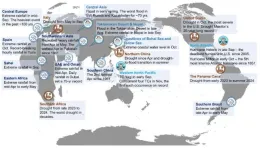(Press-News.org) Living in a family where there is genetic risk for dementia significantly affects choices about having children and how to parent, finds a new study led by UCL researchers.
The research, published in the Journal of Genetic Counselling, interviewed 13 people – both parents and non-parents – who are at risk of developing familial frontotemporal dementia (fFTD).
This form of dementia often begins in mid-life and is characterised by behavioural and personality changes. Children of an affected parent are at 50% risk of inheriting the gene that causes the disease.
People in affected families fall into three groups: people who don’t choose to find out whether they have inherited the gene (this group are at a notional 50% risk of the condition); people who choose to find out and are positive (will develop the condition); people who choose to find out and are negative (will not develop it but live in a family where many others might).
The team investigated participants’ experiences of relatives with symptomatic familial frontotemporal dementia, their attitudes towards reproductive decision-making and, among parents, influences of genetic risk status on parenting.
Through their interviews, the researchers highlighted several key concerns, including:
Fear of repetition of own experience with symptomatic relatives and how to mitigate this from recurring.
Their own genetic risk and how this could affect their future children.
The time of life they hoped to have children.
Challenges of disclosing genetic risk to children.
Interestingly, despite these challenges, when thinking about having and parenting children, genetic risk was viewed in the context of other factors such as security of relationship, housing and income, partner’s views, and a desire to maintain current lifestyle.
A key concern that many people talked about were the practical and emotional challenges of caring for someone with familial frontotemporal dementia. They were also worried about their own children or families having to deal with this in the future.
Difficult parts included handling complicated medical, care, and legal issues, managing difficult behaviours, losing their relationship with the affected person, and giving up their own plans and priorities to provide care. This often led to feelings of frustration, resentment, and guilt.
One male participant, aged 41 who had tested positive for the gene, said: “Not only would I be passing it on, I’d be dying early and they’d have to see that, it’d be terrible. So even if I didn’t pass it on, it’d be awful.”
Many people, whether they had children or not, felt that the risk of developing familial frontotemporal dementia made them feel pressured to make decisions about having children quickly.
They often used the age when their affected relative first showed symptoms as a 'deadline' for when they could still be good parents before possibly getting sick themselves. For some, this made them less likely to want to have children.
Additionally, most people found it very difficult to talk to their children about the risk of passing on familial frontotemporal dementia. For some without children, the thought of this difficulty influenced their decision on whether to reproduce.
Common worries included whether the child could handle the tough news, potential harm to the parent-child relationship, the child disagreeing with the parent's decision to have kids, and uncertainty about how to start the conversation.
Senior author, Professor Joshua Stott (UCL Psychology & Language Sciences) said: "Our study is the first to our knowledge to show how the risk of familial frontotemporal dementia, which is a devastating and fatal condition with huge impact on caregivers, affects decisions about having children. We found that knowing about the genetic risk, personal values, and the emotional and practical challenges of caregiving all play a big role. But also that these decisions took place within the contexts we all face in making such decisions such as security of relationship.
“This key role of genetic risk and the complexity and individuality of decision-making highlights the need for personalised counselling and support from people who understand the condition and genetics to help people make these incredibly tough decisions.”
As a result of their findings, the researchers are calling for better information and psychological support that helps people understand and weigh their reproductive options in a supportive, non-judgmental environment.
For example, the Rare Dementia Support Centre at UCL provides holistic and practical support for future planning through the Virtual Support Clinic and peer support for gene carriers, as part of the familial frontotemporal dementia gene carrier monthly Zoom group.
The researchers also believe it’s important that people affected are signposted to resources and potential opportunities to be involved with research, alongside being provided with information on legal and financial planning to manage distress and prepare for future needs.
Professor Stott added: “These elements aim to help at-risk individuals navigate the complex decisions related to reproduction and genetic risk in a holistic and informed manner.”
The research is part of the RD Talk study, funded by the National Institute for Health and Care Research.
Amanda’s story
Amanda, 38, from Kent, found out that her family had familial frontotemporal dementia following her father’s diagnosis of the condition in 2012 and her uncle’s in 2005.
In 2015, Amanda also discovered that she had the gene.
Amanda has two children - her eldest was born in 2007 and her second child was born in 2015. She was pregnant when she found out her genetic status.
Amanda said: “My husband and I discussed our options for having children once we knew I was ‘at risk’ and it was very much a joint decision, but not one that we made with wider family or friends. I feel it’s a very personal and individual decision (as a couple) and knew that I wanted it not to be influenced by others’ opinions. I was aware that some people close to me felt differently, so although stigma didn’t influence my choice, I was aware of it.
“Together we made the decision that we would continue on our planned path of having children regardless of genetic status, which we decided prior to knowing I had the gene, and as such became pregnant while awaiting the outcome of my test. We were aware of, and discussed the option of pre-implantation testing, but felt that this was not an option we wanted to pursue.
Some of our thought processes were around the range of variables in life, and that there are many other risks that we and any children might face, and that the risk was not a definite, but 50/50.
“On reflection I think the familial age of onset of my father and uncle also impacted our decision, as they were both around 60 when they were diagnosed. I think if our family had a younger age of onset then the conversation would have been different, as the impact on parenting and finances would have been greater. Similarly, although my family members were severely impacted by their symptoms of fFTD, they did not display overtly challenging behaviours such as aggression, which I think perhaps also impacted our decision making.
“We were also definitely aware that we wanted to be mindful of planning for the future, and of ensuring some financial stability for any future care needs.
“Overall we decided that we wanted to go ahead with life ‘as normal’, not burying our heads in the sand but with a full exploration of our concerns and attitudes, and luckily we were very much aligned in our viewpoints.”
END
Previous experience affects family planning decisions of people with hereditary dementia
Peer-reviewed | Survey
2025-01-13
ELSE PRESS RELEASES FROM THIS DATE:
Does obesity affect children’s likelihood of survival after being diagnosed with cancer?
2025-01-13
A recent population-based study indicates that among children with cancer, those with obesity at the time of diagnosis may face an elevated risk of dying. The findings are published by Wiley online in CANCER, a peer-reviewed journal of the American Cancer Society.
The retrospective study was based on information from the Cancer in Young People in Canada (CYP-C) database, including all children with newly diagnosed cancer aged 2 to 18 years across Canada from 2001 to 2020. Obesity was defined as age and sex-adjusted body mass index at or above the 95th percentile.
Among ...
Understanding bias and discrimination in AI: Why sociolinguistics holds the key to better Large Language Models and a fairer world
2025-01-13
The language ‘engines’ that power generative artificial intelligence (AI) are plagued by a wide range of issues that can hurt society, most notably through the spread of misinformation and discriminatory content, including racist and sexist stereotypes.
In large part these failings of popular AI systems, such as ChatGPT, are due to shortcomings with the language databases upon which they are trained.
To address these issues, researchers from the University of Birmingham have developed a novel framework for better understanding large language ...
Safe and energy-efficient quasi-solid battery for electric vehicles and devices
2025-01-13
Technological advances have led to the widespread use of electric devices and vehicles. These innovations are not only convenient but also environmentally friendly, offering an alternative to polluting fuel-driven machines. Lithium ion batteries (LIBs) are widely used in electrical appliances and vehicles. Commercial LIBs comprise an organic electrolyte solution, which is considered indispensable to make them energy efficient. However, ensuring safety becomes a concern and may be difficult to achieve with the rising market demand.
While solid-state batteries can help mitigate safety issues, the interface between solid electrodes and the ...
Financial incentives found to help people quit smoking, including during pregnancy
2025-01-13
Rewards and financial incentives are successful methods to help people quit smoking, according to a new Cochrane review co-led by a University of Massachusetts Amherst public health and health policy researcher. For the first time, the researchers also found “high-certainty evidence” that this intervention works for pregnant people as well.
A previous review of studies, also published in the Cochrane Database of Systematic Reviews, found moderate certainty that financial ...
Rewards and financial incentives successfully help people to give up smoking
2025-01-13
Offering rewards helps people to stop smoking, with success rates continuing long after incentives have stopped.
The new research, led by the University of East Anglia, also explored whether incentives were effective in helping pregnant women to give up smoking.
While previous research found rewards played a moderate role in encouraging pregnant women to quit smoking, this up-to-date study found there is now “high certainty evidence” that such schemes are successful in this ...
HKU ecologists reveal key genetic insights for the conservation of iconic cockatoo species
2025-01-12
Ecologists at the School of Biological Sciences of The University of Hong Kong (HKU) have made valuable discoveries that could transform the conservation of two iconic cockatoo species: the Sulphur-crested cockatoos and the critically endangered Yellow-crested cockatoos – with only 2,000 individuals remaining in the wild for the latter.
Until now, no whole-genome research had been conducted on either species, which were identified solely by subtle morphological differences. Through two innovative studies, the team ...
New perspective highlights urgent need for US physician strike regulations
2025-01-11
Key Takeaways:
A new Perspective piece in The New England Journal of Medicine led by the Harvard Pilgrim Health Care Institute examined the increasing frequency of physician strikes around the globe.
The piece is one of the first to provide international lessons on balancing physician collective bargaining rights with patient protections in the U.S.
The findings underscore the urgent need for regulatory reforms to address the increasing frequency of physician strikes and ensure the sustainability of the healthcare system.
Boston, MA – A ...
An eye-opening year of extreme weather and climate
2025-01-11
From the persistent droughts of southern Africa and Central America in the early part of the year to the more recent devastating extreme rainfall in Spain and the deadly Hurricane Helene along America’s east coast, 2024 has been a year of climate events that affected the lives of billions of people.
In a recent paper published in Advances in Atmospheric Sciences, an international team of scientists led by Dr Wenxia Zhang at the Institute of Atmospheric Physics, Chinese Academy of Sciences, provide an overview of the characteristics and impacts of the most notable extreme events of the year, including rainfall and flooding, ...
Scientists engineer substrates hostile to bacteria but friendly to cells
2025-01-11
Tokyo, Japan – Researchers from Tokyo Metropolitan University have created nanostructured alumina surfaces which are strongly antibacterial but can be used to culture cells. They found that anodic porous alumina (APA) surfaces prepared using electrochemistry in concentrated sulfuric acid had unprecedented resistance to bacterial growth, but did not hamper cell cultures. The team’s technology promises to have a big impact on regenerative medicine, where high quality cell cultures without bacterial contamination may be produced without ...
New tablet shows promise for the control and elimination of intestinal worms
2025-01-11
A new tablet combining albendazole and ivermectin is safe and more effective than albendazole alone in treating Trichuris trichiura and other soil-transmitted helminths (STH), according to a clinical trial conducted by the STOP consortium and led by the Barcelona Institute of Global Health (ISGlobal), a centre supported by “la Caixa” Foundation. The findings, published in The Lancet Infectious Diseases, open opportunities to improve the control of these neglected tropical infections, which affect around ...
LAST 30 PRESS RELEASES:
Brainwaves of mothers and children synchronize when playing together – even in an acquired language
A holiday to better recovery
Cal Poly’s fifth Climate Solutions Now conference to take place Feb. 23-27
Mask-wearing during COVID-19 linked to reduced air pollution–triggered heart attack risk in Japan
Achieving cross-coupling reactions of fatty amide reduction radicals via iridium-photorelay catalysis and other strategies
Shorter may be sweeter: Study finds 15-second health ads can curb junk food cravings
Family relationships identified in Stone Age graves on Gotland
Effectiveness of exercise to ease osteoarthritis symptoms likely minimal and transient
Cost of copper must rise double to meet basic copper needs
A gel for wounds that won’t heal
Iron, carbon, and the art of toxic cleanup
Organic soil amendments work together to help sandy soils hold water longer, study finds
Hidden carbon in mangrove soils may play a larger role in climate regulation than previously thought
Weight-loss wonder pills prompt scrutiny of key ingredient
Nonprofit leader Diane Dodge to receive 2026 Penn Nursing Renfield Foundation Award for Global Women’s Health
Maternal smoking during pregnancy may be linked to higher blood pressure in children, NIH study finds
New Lund model aims to shorten the path to life-saving cell and gene therapies
Researchers create ultra-stretchable, liquid-repellent materials via laser ablation
Combining AI with OCT shows potential for detecting lipid-rich plaques in coronary arteries
SeaCast revolutionizes Mediterranean Sea forecasting with AI-powered speed and accuracy
JMIR Publications’ JMIR Bioinformatics and Biotechnology invites submissions on Bridging Data, AI, and Innovation to Transform Health
Honey bees navigate more precisely than previously thought
Air pollution may directly contribute to Alzheimer’s disease
Study finds early imaging after pediatric UTIs may do more harm than good
UC San Diego Health joins national research for maternal-fetal care
New biomarker predicts chemotherapy response in triple-negative breast cancer
Treatment algorithms featured in Brain Trauma Foundation’s update of guidelines for care of patients with penetrating traumatic brain injury
Over 40% of musicians experience tinnitus; hearing loss and hyperacusis also significantly elevated
Artificial intelligence predicts colorectal cancer risk in ulcerative colitis patients
Mayo Clinic installs first magnetic nanoparticle hyperthermia system for cancer research in the US
[Press-News.org] Previous experience affects family planning decisions of people with hereditary dementiaPeer-reviewed | Survey



